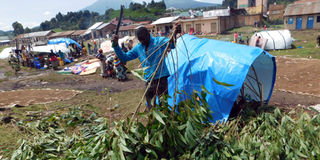Prime
Locals, refugees fight over resources

A Congolese refugee cuts tree branches as he prepares to construct a shelter at Bunagana Public Market land in Kisoro District last month. PHOTO/ROBERT MUHEREZA.
What you need to know:
Isingiro District hosts 155,123 refugees in Nakivale and Oruchinga settlement camps
Authorities in Isingiro District have appealed to the government and other stakeholders to include protection of natural resources in refugee policies.
The district, which hosts 155,123 refugees in Nakivale and Oruchinga settlement camps, has witnessed several conflicts between refugees and the host communities over natural resources.
“We remain committed to our generosity to host refugees. But we are competing for the same natural resources such as trees, vegetation, and water,” Mr Aaron Turahi, the district chairperson, said this week.
“Their (refugees) only source of firewood and building materials is trees and vegetation but with the surging numbers, do you expect any forest cover or vegetation to survive in the host communities?” he asked.
Mr Ramadhan Ssendegeya, the Nakivale refugee welfare committee chairperson, called for more support, adding that they had registered several cases of attacks on refugees by memebers of the host community.
“We need support on tree planting such as seedlings to conserve the environment and alternative sources of energy,” he said.
Ms Sharon Nyangoma, a community officer in Juru sub-base camp, Nakivale settlement, said: “Limited resources pose a big challenge in refugee settlements, especially among women, girls, and children since they are the ones mostly involved in the collection of firewood and fetching water. This puts them at risk of sexual violence and assault.”
Ms Justine Gonza, the assistant refugee commandant at Rubondo sub-base camp in Nakivale, appealed to donors, religious and charity organisations to support the government to provide enough resources for refugee operations.
While launching an environment campaign at Nakivale refugee settlement on June 20, the State Minister for Refugees, Ms Esther Anyakun, admitted that a huge population poses a big challenge on the environment.
She, however, promised that the government was committed to conserving the environment.
“We are committed to ensure massive tree planting in refugee host districts to ensure green cover in all 13 refugee hosting settlements. We are starting with planting 40,800 trees across all these settlements but we are appealing to UNHCR (United Nations High Commission for Refugees) to increase funding and support for this activity,” she said.
Firewood use
According to UNHCR, refugees in Uganda consume at least 1.1 million tonnes of firewood every year. Each individual in the refugee community is estimated to consume up to 1.6 kilogramme firewood per day, compared with host community members who consume up to 2.1 kilogramme per day. This puts a strain on the availability of wood, grass and other resources in refugee-hosting districts.




